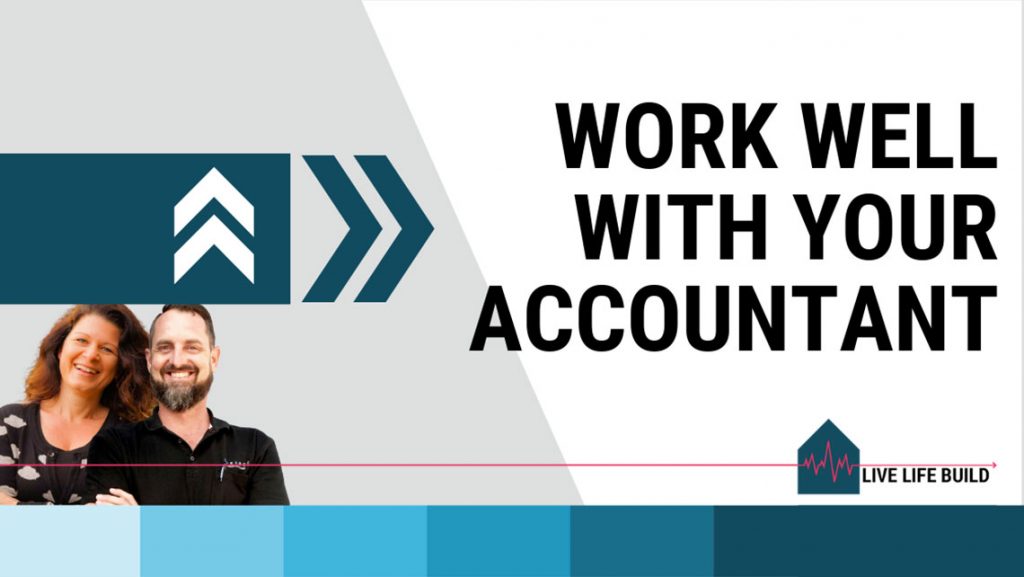How can you work well with your building business accountant?
And what numbers should you really pay attention to, to understand your building business well?
In this blog, we take you through the 5, 4, 3, 2, 1 of how to work well with your accountant, and know the real numbers of your building business.
So often, we hear of builders getting themselves into trouble because they don’t understand the true financial position of their business.
As a builder, you’ll be handling large sums of money as it passes from your client, through your accounts, to your suppliers, subcontractors and team.
And yet, so many builders get themselves into trouble, because they don’t have an accountant who understands building businesses (and how differently they operate). Or they, as the builder, get bamboozled by the terminology, the reports, and the money on paper – and think they’re in a much better financial position than they actually are.
They then go and spend money they don’t have, and continuously struggle to make ends meet, pay themselves, or keep their business profitable.
It doesn’t have to be like this. You can be in control of your finances, and work well with your accountant.
You’ll learn from Duayne how he has navigated this in his building business, and works closely with his accountant to get the information that gives him real feedback on his business – and regularly.
Check out our 5, 4, 3, 2, 1 of our 6P Methodology PROFESSIONAL: How to work well with your building business accountant.
5. MOST BUILDERS THINK YOU ONLY NEED TO GO TO AN ACCOUNTANT ONCE A YEAR
You may switch off with this topic. And look, I don’t blame you as it’s definitely not one of my favourite topics either.
If you are anything like I was when I started my business, I just did what I was used to seeing and hearing other Builders and Tradies doing. And that was only going and meeting with my Accountant once a year. My bookkeeper would do most of the BAS stuff and send it to my Accountant, and unless there was an issue I didn’t really need to meet with my Accountant.
That’s what I thought.
And it got me into a lot of trouble as I didn’t understand my true numbers or how the money got moved around within my business.
I was so wrong.
Anything worth doing well should be done a lot more than once a year. You wouldn’t expect to be super fit if you went to the gym once a year, so why would you expect your finances to be super fit if you only look at them once a year.
I’m sure you have had the conversations with your accountant where the accountant tells you that ‘hey, you have made money!’ You sit there and ask, ‘but where is it all as there’s none in my bank and we are always struggling??’
This is because whatever money you are spending to live and on personal things may need to be treated as personal income.
If you don’t know and understand your numbers or pay yourself a set salary, your personal income may end up being whatever you are spending – whether your business can afford it or not.
We need to set and understand our personal budget requirements and pay ourselves a regular salary so we are not taking extra cash that the business requires to operate. And this salary must be considered when quoting and calculating our overheads as part of the business’ costs.
Many builders fall into the trap of seeing large payments come into the bank account and think they have extra money to spend on personal things.
It’s easy to forget that you need to set aside money for GST, payment of income tax & ongoing business running costs.
If you take out more than your business can afford, and your company makes a loss, it may be because you have spent more than the business has made.
So, in reality you are actually stealing from your business. And you are probably paying a much higher tax rate in your personal name.
This is why so many Business owners never have any cash and are always chasing their tail. Your company should always make a PROFIT.
So how have I got my head around this?
I believe you need to use your accountant as another team member in your business.
If you outsource your accounting, start having regular meetings with them. I would recommend you meet once a month. Get them to teach you how to know your numbers.
If you have a bookkeeper or accountant that works in your business, make sure you are having regular reviews with them. (I do this every fortnight in my business).
When you do this, you will learn to know your numbers. Numbers to pay attention may include:
- Money coming into the business
- Money going out of the business
- Is the business making money?
- Are your projects meeting budget?
- How much are you pulling out of the business for personal stuff?
- What tax is coming up to be paid
- and so much more.
Knowing your real numbers on a regular basis is the only way to run a healthy, profitable, building business.

4. FIND A GOOD ACCOUNTANT WHO UNDERSTANDS THE BUILDING INDUSTRY
This probably isn’t something that a lot of Builders have ever considered.
Finding an Accountant that understands how your business operates is extremely important.
So, you need to find someone that understands the industry.
A building business is very different to many other businesses as you have to manage a lot of money that just really passes through your accounts.
For a start, so many Builders aim for high turnover but don’t understand that most (often 70 – 80%) of the money isn’t theirs.
Let’s say your business turnover is 1.5 million dollars.
At least $1 million of these funds will simply be coming into your account, and then going straight back out again, to pay all your trades, contractors, employees and materials. Then with what’s left you have to pay all the running costs of the business, the GST and importantly your income tax. Then (if there’s any left) it’s yours.
You can see with this simple exercise how easy it is for Builders to get into trouble, as they would be calling themselves a ‘1.5-million-dollar’ business. However, in reality, the profit is likely to be less than $250,000. This would be quite a healthy 16% profit margin but shows the difference between the cash that flows through the business to what is available to spend.
(And remember, this profit isn’t your salary – it’s the money made after the costs of the business have been already been paid, which includes your salary.)
So, finding an accountant that understands this and can explain things clearly is important.
In QLD, the QBCC has minimum financial requirements each year for Builders to try to ensure each business has the ability to pay their debts and has enough assets to meet ongoing obligations. It’s important to discuss this with your accountant, as each state has their own financial licencing requirements.
You won’t find the right advice going to an accounting firm that only wants to meet with you once a year. This might have been ok when you were an apprentice or a contractor. Now that you are a builder, you need to be talking with accountants that are experienced with the industry. And then you need to be meeting with yours more regularly.
Talk to other builders and get some recommendations for specialist accountants. You will pay more for the right service. But don’t be afraid to pay for it, as having someone that understands how a building business works will change everything.
Just as you seek to build a relationship with your homeowners, you should also be building a long-term relationship with your accountant. Once you find one that works with you and helps you understand your real numbers, you won’t look back.
The last thing you want is an accountant that just tells you to spend money to save tax. Because you need to have the money to spend in the first place!
Ask your accountant if they understand your state’s building industry requirements, and do they have many other building industry clients.

3. UNDERSTAND ACCOUNTING TERMINOLOGY
Homeowners often say that when they are talking to Builders, they feel we’re talking another language.
This is because we talk about the same things every day, we know our trade, and quite often take it for granted that the clients we are talking to will understand exactly what we are talking about.
Clients don’t understand what a plumb-bob is, what all the framing members are when we are walking around pointing at things, or even understand all the different stages of the build.
And, as builders, we don’t always understand what accountants are talking about when we meet with them. It can be like they are speaking another language.
Don’t be like I was. I was afraid to put my hand up and ask questions. In my early days, I just listened to what I was being told and even though I didn’t understand, I never did anything about it.
You want to have an accountant who will spend the time with you and help you. Someone you can ask questions and not feel uncomfortable about asking them. (There are also lots of accountants around that do online training as well if you don’t feel comfortable asking questions in person).
Do you understand some of these key terms:
- Profit & loss statements?
- What gross profit is?
- What net profit is?
- What net income is?
- What owner’s equity is?
- What accounts payable are?
- What costs of goods sold are?
- What your overheads are?
I could go on for days!
It’s ok if you don’t understand this terminology, because you are a builder! It’s the same as a client not understanding the terminology you use. But I’m sure you have learnt that in order to have a great relationship with your clients, you have to educate them.
A good accountant should want you to understand these terms and be patient with you to help you wrap your head around them. Because like building, it can sound like another language to you.
So don’t get bamboozled and embarrassed if you don’t understand accounting terms.
It’s not your job to, but understanding them will make a huge difference to your business.

2. WHAT REPORTS TO ACCESS, AND PAY ATTENTION TO
There is so much data in a building business, and so it can be hard to know what you should be looking at to know how the business is going. Especially if you don’t understand what it all means.
Over the years, as I have learnt to understand my numbers more, we have developed a system that allows me to have a great overview of the business.
Every 2 weeks on a Thursday I sit with my accountant for 30 – 40 minutes and review the following:
Report #1: Individual project costs
When we start a new project, we pull the CSV file from QuoteSpec (my proposal software) and put all our quoted pricing into our accounting software. Doing this per project means I can set things up to know how each project is tracking right from the start.
My book-keeper then ensures all bills and invoices are entered, assigned to their trade, supplier or sub-contractor, and kept up to date as they come in, and they track against the figure from the original proposal.
Then every 2 weeks, I can see the real numbers because the previous two weeks bills have been entered. As they get entered in, I’m able to look at what our quoted costs are against what our actual costs.
This allows me to understand exactly how our projects are tracking in real time. And, by knowing the numbers and how the project is tracking, we can predict if areas are off track and if something needs to be done before it goes over budget.
This process also allows us to invoice our clients accurately every 3 weeks and maintain positive cashflow. We know exactly what has been spent and what invoices are still to come in.
Report #2: Accounts Payable
This is all the bills that have come into the business in the previous two weeks that have not been paid. It includes all business expenses from direct project costs, running costs and overheads.
When we review this, I’m looking to see what bills are due this week, next week and at the end of the month. I’m also reviewing what tax is owing and loan repayments to ensure we have the cash coming in to pay these on time.
This gives me the ability to see the bigger picture of the business cash flow and make educated decisions.
Report #3: Accounts Receivable
This is all the payments we have owing to the business. This includes payments such as progress draws, any of our PAC Process fees or any deposits for new projects.
It’s really important to have a clear understanding of what funds you have coming into the business. This allows you to predict growth and cash flow.
Obviously, there are far more accounting reports you can look at and that tell you lots of other information.
However, for me these three have been the ones that tell me the most accurate data I need to know to see how my business is tracking. The reason we do it every two weeks is consistency, as seeing the real numbers regularly has taught me a lot. It gives me the ability to make quick and accurate business decisions.
The numbers don’t lie.

1. MOST ACCOUNTANTS ARE TRYING TO REDUCE YOUR TAX
So, here’s the tricky part.
Most accountants are just doing their job and trying to reduce your tax.
This is great, however if you don’t understand your numbers, you could be slowly getting yourself into trouble. There is so much more to accounting than most people think.
A good accountant shouldn’t just be doing your tax. They should be structuring everything in your business to minimise the tax you pay.
Remember too, that paying tax isn’t a bad thing – it means you are making money! It is really just how much tax you pay, and also setting you up as your business grows to reduce your risks. This latter point is really important.
One reason it is important to show the business making a profit is so that you have more chance of accessing finance when you need to upgrade business equipment or vehicles.
Also, if you can show your bank that the business is paying you a set salary, it will assist in accessing finance for personal loans (such as when buying a home or rental property).
Having a good accountant or bookkeeper that you can sit with regularly is the true key to a successful and profitable business.
Understanding money on paper vs real money in your bank is so important.
You know the story; the accountant tells you that you’ve made a good profit. Or the best one is this: it’s coming up to tax time and you should spend money to reduce your tax.
(Have you had an accountant say these to you?)
You think to yourself, “How can I have made profit?? How can I buy a new truck or machinery, there’s no money in the bank and I can’t pay the bills?”
Or even worse you take their advice, spend up, and then a couple of months later you are behind on your bills, you don’t have enough money coming in, and you end up under more pressure.
We suggest that instead, you consider your business accounting as a means of understanding and managing your money.
Sit with your accountant or bookkeeper regularly and get your head around the numbers. Remember the numbers don’t lie.
Then do your tax planning before the end of the financial year to get everything in order to reduce tax and manage risks.
Manage regularly and proactively, and you’ll be in a much better place to understand the real financial position of your building business.

So, here’s our 5, 4, 3, 2, 1 to identify your ideal project.
5. Have you asked your team what their goals are?
4. How can you help and facilitate your team’s goals?
3. What are your goals as a team?
2. Holding people accountable.
1. Celebrate the wins and create a good work environment.
Live Life Build’s 6P Methodology unlocks the 6 ways to elevate your building business:
PERSONAL | PROJECTS | PEOPLE | PARTNERSHIPS | PROCESSES | PROFESSIONAL
Are you meeting regularly with your accountant and understanding the real numbers of your building business?

